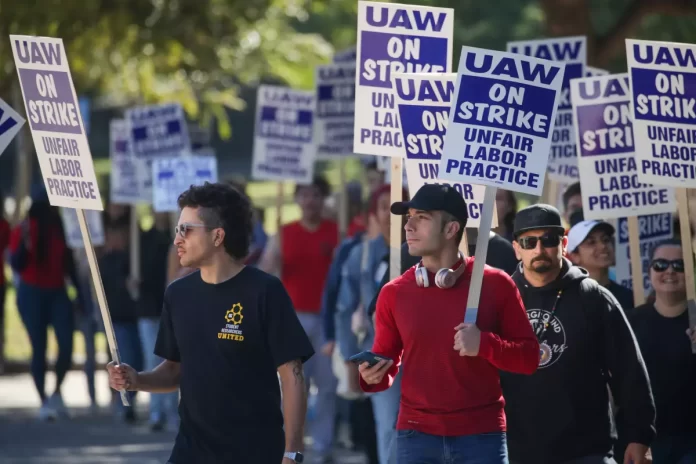Santa Cruz, May 18: The 48,000-member University of California (UC) academic workers union has announced a strike at UC Santa Cruz starting Monday, in response to alleged free speech violations during recent pro-Palestinian protests. In a preemptive move, the University of California filed a labor complaint on Friday to halt what they claim is an illegal action, further escalating tensions within the university system.
The union’s decision to strike at the 19,764-student campus, which includes nearly 2,000 graduate students, could significantly disrupt operations during the crucial final weeks of the spring quarter. This strike follows a vote where 79% of union members authorized leadership to call for “rolling” strikes. These strikes are not related to wages or benefits but are aimed at addressing alleged unfair labor practices against union members supporting pro-Palestinian protests, which demand the university divest from Israel and weapons manufacturers.
The union, representing graduate student teaching assistants, researchers, and other academic workers across UC’s 10 campuses, plans to initiate similar work stoppages at other campuses to press UC administrators to change their stance on pro-Palestinian protests.
UC leaders responded by filing a state unfair labor practice charge against the union, urging the state labor board to order student workers to “cease and desist” the walkout. They argue that the strike violates the no-strike clause in the union’s contract, ratified in late 2022, which secured significant pay raises and benefits for union members.
“This strike directly violates the collective bargaining agreement’s no-strike clauses and is unrelated to UAW members’ employment with the university,” UC stated in its filing. The university contends that allowing this strike would set a precedent for continuous strikes advancing political and social viewpoints, impacting public agencies statewide.
- Felix De La Torre, general counsel for the labor board, indicated that a decision on the cease and desist order could come early next week. The board has also offered mediation to resolve the dispute.
The Santa Cruz strike follows two weeks of pro-Palestinian encampments on campus, where tensions escalated with protesters claiming they faced an “imminent threat of police sweep” after receiving notices to end camping activities on university property. Campus Provost Lori Kletzer stated the university aims to minimize strike disruptions, especially given recent educational and research interruptions.
The strike at Santa Cruz is just the beginning, with the union planning to continue walkouts at other campuses if their demands are not met. The California Labor Federation has granted a strike sanction, encouraging other unions to support the picket lines if their contracts allow.
Rafael Jaime, co-president of United Auto Workers Local 4811 and a doctoral candidate at UCLA, emphasized the strike is about free speech and peaceful protest rights. He called for the university to reconsider disciplinary actions against student workers involved in the protests.
Pro-Palestinian protests have caused significant unrest across UC campuses, particularly at UCLA, UC Irvine, and UC Berkeley. These campuses have seen violent confrontations and subsequent investigations into the university responses. In contrast, UC Riverside and UC Berkeley have reached agreements with protesters to end encampments and explore divestment from weapons companies, though they have rejected targeting Israel specifically.
The union’s strike highlights the broader issue of free speech and protest rights on campus, a contentious topic amidst the ongoing Israel-Hamas conflict. National Jewish groups have criticized the divestment movement as antisemitic, arguing it seeks to delegitimize Israel, the only predominantly Jewish nation.
As the situation develops, the UC system and the union remain at odds over the balance between free speech, protest rights, and contractual obligations, with the potential for further campus disruptions looming.




